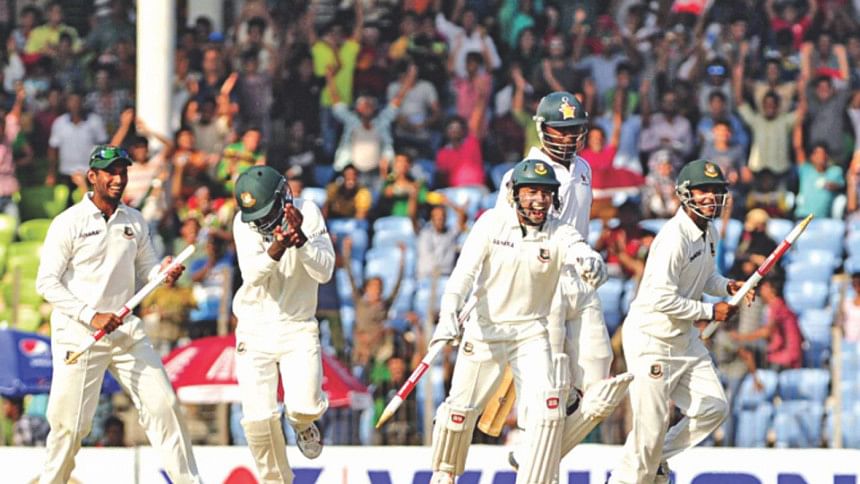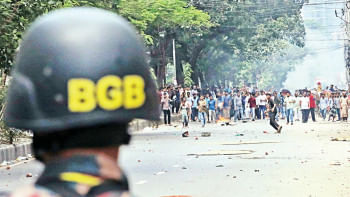New Bangladesh!

OVER the years, Bangladesh earned many titles. According to National Professor Mustafa Nurul Islam, the name of our country, 'Bangladesh', was first coined by Kazi Nazrul Islam, our national poet, probably in 1942. Much earlier than him, in 1905 to be precise, Nobel Laureate Rabindranath Tagore called it 'Sonar Bangla' (Golden Bengal) in his famous patriotic song 'Amar Sonar Bangla'. It was accepted as the national anthem of Bangladesh in 1971. Bangabandhu Sheikh Mujibur Rahman, the father of the nation, dreamed of building 'Sonar Bangla' but did not live long enough to fulfill his dream.
Henry Kissinger, former national security advisor to US President Richard Nixon, whose administration had opposed the creation of Bangladesh tooth and nail during the war of liberation, termed Bangladesh a 'bottomless basket' soon after liberation. Bangladesh was then struggling hard to rebuild its economy from the rubble of the war.
Decades later, Bangladesh became self-sufficient in food production, the second largest exporter of garments and the tenth top recipient of remittances. During her second term in office, Prime Minister Sheikh Hasina introduced a new slogan, 'Digital Bangladesh,' to ensure "people's empowerment, establish transparency, accountability and good governance at every level and sector, and take government services to the doorsteps of the people".
Dan W Mozena, former US ambassador to Bangladesh said in 2013 that Kissinger's remark was "totally wrong" and called Bangladesh "the next Asian Tiger." In his words, "…I call the country the next "Asian Tiger." Goldman Sachs talks about the emerging 11 countries, including Bangladesh. JP Morgan talks about the Frontier 5, including Bangladesh. A McKinsey report said Bangladesh could be the world's largest exporter of ready-made garments and household textiles. Bangladesh has the potential to become a big player in generic pharmaceuticals, building small and medium freighters, building tugboats, footwear, finished leather products, flowers, silk, frozen shrimp. Combine that with the ongoing agricultural revolution that is happening this very minute where you will have a Bangladesh that already has a rice surplus. Bangladesh is the nexus of inter-regional trade, right in the middle of the Indo-Pacific economic corridor." What a contradiction with Henry Kissinger!
Bangladesh earned the latest title very recently. While listening to the commentary on the fourth day of the first test match between Bangladesh and Pakistan in Khulna, I came across a new term, 'New Bangladesh' coined by a foreign commentator. He was not talking about our progress in economic or social sector but about the tremendous improvement of the Bangladesh cricket team during the last two years. Gone are the days of a series of humiliating defeats and unpredictable performances of our team in batting, bowling and fielding. They have improved in all sectors and in all the categories of the game. They played extremely well in the ICC World Cup, securing a berth in the quarter final for the first time. Had there been proper umpiring, Bangladesh could perhaps have qualified to play in the semi-final of the World Cup.
Recently, Bangladesh played three ODIs and one T-20 match against Pakistan, convincingly whitewashing the visitors in both the series. On the fourth day of the first test match, Pakistan collected a huge total of 628 runs in their first innings, against a score of 332 runs made by the host team. Pakistan were hoping, quite legitimately, to beat Bangladesh by an innings!
Bangladesh came back into the match remarkably well on the day. They first took the remaining five wickets to oust Pakistan before lunch. Taijul Islam alone took six wickets. When Bangladesh started to bat for the second innings, everyone was expecting that the openers would bat very cautiously to avoid a defeat by an innings. To everyone's surprise, the Bangladesh openers, Tamim Iqbal and Imrul Kayes, batted aggressively and scored a total of 273 runs without any loss at the end of the day.
On the fifth day, Bangladesh scored 555 runs for the loss of six wickets only forcing Pakistan to a draw for the first time in test cricket. Tamim Iqbal scored a splendid double century (206 runs) and his partner Imrul Kayes 150 runs. Together they collected 312 runs, the highest first wicket partnership record for Bangladesh and the fourth for the world. Well done, Bangladesh! This is what the commentator called 'New Bangladesh!'
If we look around, we find that our cricketers are performing well. Our farmers, garment workers, factory workers and expatriate workers are all performing well. Only one drawback is agitating the minds of the people. While all are performing so well in their respective fields, why can't our political leaders perform like others do? Do they not want to be a part of 'New Bangladesh'? Can't they simply practice what they preach?
The writer is a retired nuclear engineer.

 For all latest news, follow The Daily Star's Google News channel.
For all latest news, follow The Daily Star's Google News channel. 



Comments